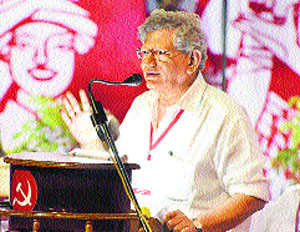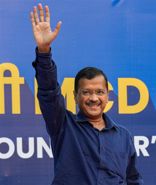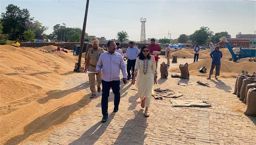
Sitaram Yechury has to re-energise the party''s organisational strength through mass mobilisation
Shelley Walia
Former Venezuelan President Hugo Chavez, addressing a rally against imperialism at the World Social Forum in Caracas in 2006, urged activists “to take up the work of a great international anti-imperialist front to do battle in the whole world. We have to bring together all our causes. Unity, unity, unity! We can only do it united.” This was the clarion call for a socialist revolution, a call to the Left around the world to halt the gradual decline of its intellectual values.
The Left cannot be edited out of history or from Indian politics. The spectre of Marx lurks in all places where economic deprivation is widespread and where progressive struggles gear up for political and economic reorganisation. The election of Sitaram Yechury, a brilliant parliamentarian, as the General Secretary of the Communist Party of India augers well for radical and sustained post-mortems of Marxism with effective interventions in the politics of future. "Our agenda is the future, it is not the past," emphasises Yechury.
Undeniably, the failure of the Communist Party of India (Marxist) has been exceptional and, more so, owing to the deficiencies of its leadership and its failure to project a convincing and intellectually engaging socialist alternative in opposition. What is the future of the Left? In a bourgeois world, is the middle class on the rise? Is there a decline of class sentiment? Or has the breakdown between generations undermined the traditional Left culture? These are some of the central questions on which the party has to deliberate in this moment of crisis when we are faced with escalating wealth and a consequent decline of working-class identification. Unless the Left in India moves with the times, it will cease to be a national opposition.
It is clear that the predicament of restructuring itself remains acute within the context of the right-wing Narendra Modi establishment with its corporate character in an India that is faced with grave issues of caste oppression, environmental degradation, gender discrimination and poverty. Yechury, along with his Politburo, is set to give a serious consideration to the re-evaluation of economic progress, and more than anything else, to the re-energising of the party's organisational strength through mass mobilisation. Undeniably, it has the intellectual acumen to see it through.
As Yechury said in a recent interview, “Concrete analysis of concrete situations is what Marxism requires.” Mass unemployment, homelessness, police accountability, famine and economic oppression are issues on the CPM's agenda; it has to be seen in the coming days if the party under his leadership succeeds in consolidating its ranks in a massive kick-start to the people’s movement. The party realises that AAP highjacked its ideology, acting on it with a praxis that is absent in the Left. The organisational strength of Kejriwal and the triumphant markers of his proactive stance on the issue of corruption bestowed on him and his party the credibility that the communists lacked. A vital opportunity for mobalising mass support inevitably slipped out of the hands of the unimaginative local leadership.
Though the struggle against the state has often trounced the Left, it has managed to repeatedly regain its vigour by aligning itself to the proletarian with its imperceptibly growing political awakening. Its strength therefore will depend on the unity of Left forces, not on expedient but ideological grounds aiming for the larger good of society. The standard Marxist model, favouring the economic determinism of history and consciousness, needs to be reformulated in the light of wider processes of society, especially the role of the media and the building of a new alliance between feminists, marginalised groups, lesgays, teachers, and the working class. Moreover, the party must not forget to aggressively pursue other viable agents of change like the Green movement, ethnic and national struggles, and exemplary public education with the hope of making headway towards far-reaching social transformation.
As regards neoliberalism, the unrelenting siege of many developing nations by what Eduardo Galeano calls the neocon "commercial masters of the world" must prompt Yechury to condemn the systems that have usurped socialism. He realises that the party has lost its electoral and political relevance and must now look into the future for redefining the nature of power and the conditions of existence in a fast developing modern India, thereby striking the right balance between technological ascendancy and emancipatory politics. And in this future, Yechury strongly maintains, there is no scope of any coalition either with Narendra Modi or Rahul Gandhi owing to the variance with their economic policies and the exploitative Hindutva environment where, in his words, “mythology is replacing history and theology is replacing philosophy.”
The Left, as envisaged by the CPM, has already begun its process of recovery and of regaining confidence in Bengal and Kerala. The decimation of its substantial public support has provoked a challenge for rejuvenation of the party in Bengal. It, therefore, is determined to end its irrelevance through a deep involvement with the question of political economy that compels a clash of the anti-capitalist forces with the unilateralism of the pseudo-technical focus of liberal democracy and India's land-owning rich that resorts heartlessly to market strategies of predatory capitalism obsessed with profit and expropriation of natural resources rightly belonging to the people.
It may therefore be conjectured that the Left is passing through a new phase of hope and forward-looking expectation ignoring its protracted obsession with a haunting past. Its resilience to survive lies in its newfound passion for a complete turnaround by initiating new strategies of consolidation through the support of the youth of the country, a strategic and imperative connect with the people. The revival of people's movements in Latin America, in Greece and in Spain along with the fury of the Arab Spring gives a new impetus to the wilting Left to challenge the neoliberal and its moral high ground that has failed to come up with any solution to a fragile, and in certain regards, disastrous present. The claims of Sitaram Yechury must be taken critically though not necessarily at face value. It is hoped that the politics his party generates will impact a polarised nation ravaged by ethnic, religious and nationalist conflicts, offering a viable alternative to the emerging “new barbarism”.
The writer is a Professor and Fellow, Department of English and Cultural Studies, Panjab Uuiversity, Chandigarh



























